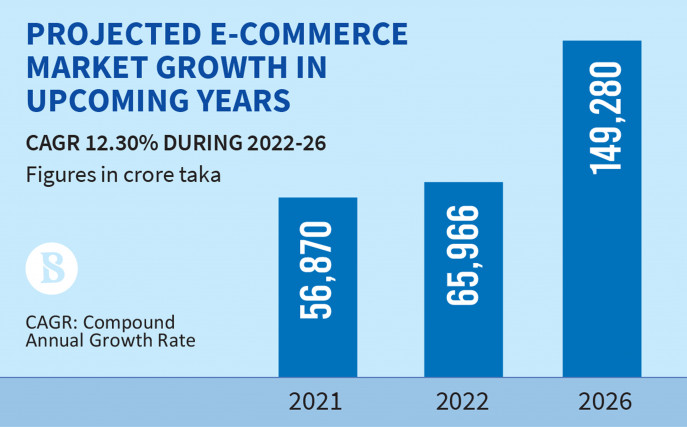Bangladesh e-commerce sales to more than double by 2026: Research

The business-to-customer e-commerce market in Bangladesh is expected to grow by 17.61% on an annual basis, aimed at reaching Tk65,966 crore in 2022, according to a recent market research.
The e-commerce market size in 2021 was about Tk56,870 crore and will be around Tk1.5 lakh crore by 2026, said the Dublin-based trade research institution ResearchAndMarkets.com.
According to the research institute, the report "Bangladesh B2C Ecommerce Market Report 2022" includes registered e-commerce companies, non-registered online platforms and social media-based trading pages.
Products and services cover retail shopping, travel and hospitality, online food service, media and entertainment, healthcare and wellness, and technology products and services.
Md Tajdin Hassan, chief marketing officer of leading local e-commerce firm Daraz Bangladesh, told The Business Standard that easy shopping and payments will help drive up the market growth as extensive customer service will play a vital role.
Tapan Kanti Ghosh, senior secretary of the Ministry of Commerce, told TBS that the report fairly illustrates the overall e-commerce landscape in Bangladesh.
According to a report by the e-Commerce Association of Bangladesh (e-Cab) last year, there were more than 2,500 e-commerce platforms in Bangladesh, of which 1% are large businesses, 4% medium, and 95% small businesses. Some 1,600 e-commerce entrepreneurs were e-Cab members.
The e-commerce platform Evaly commenced its operations in Bangladesh late 2018. The platform soon became a major market player by offering various lucrative offers and huge discounts. Evaly was, however, later charged with fraud and corruption and its operations are currently suspended.
Similar allegations were raised against several other e-commerce platforms, including Alesha Mart, Eorange, Qcoom, Dalal Plus, Dhamaka Shopping, and Sirajgonj Shop. Most of the embattled sites are now shut down.
In 2018, the government published a digital commerce policy as a guideline for e-commerce websites and to ensure consumer rights.
In June 2021, the Bangladesh Bank introduced the payment gateway 'escrow service' to ensure customer rights and stop fraudulent activities.
But Tapan Kanti Ghosh said there are still many unregistered social media-based e-commerce firms. Besides, many online medical service providers and tourism businesses are yet to come under the official framework.
According to an official of the Bangladesh Telecommunication Regulatory Commission (BTRC), there are nearly 50,000 Facebook pages that sell or supply products retail and wholesale in Bangladesh.
The official estimated that the annual tax and value added tax (VAT) of these Facebook-based ventures could be as much as Tk10,000 crore.
"Once our e-commerce policy is fully implemented, the government will be able to collect revenue from all types of businesses," Tapan added.
Ahsan H Mansur, executive director of the Policy Research Institute of Bangladesh (PRI), said fragile consumer confidence is a major challenge for the country's e-commerce sector.
"Online shopping is gaining popularity across the world very fast. It is but natural that the sector will also boom in Bangladesh in the years ahead," he added.


 Keep updated, follow The Business Standard's Google news channel
Keep updated, follow The Business Standard's Google news channel














